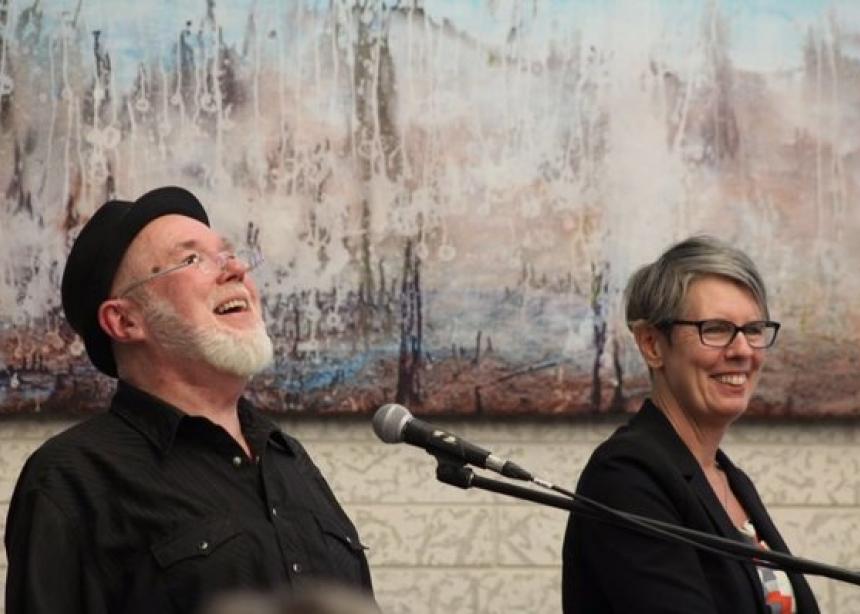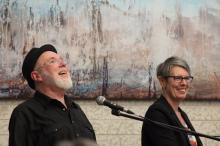Why does polarization so frequently characterize our discourse? How can people find common ground?
Those were two of the questions at the heart of “Us and Them: How did we become so polarized?”, a panel discussion held at Canadian Mennonite University (CMU) earlier this month.
“So many people today live in their own echo chambers, politically, religiously and in larger society,” Terry Schellenberg, vice-president external at CMU, told the Winnipeg Free Press in advance of the event. “They find it hard to engage in meaningful ways with people who see things differently. More than ever, we all need to listen well, befriending people who see things otherwise, to listen deeply and well.”
Moderated by CMU professor Paul Doerksen, the event—which you can watch below—featured Larry Updike, a former radio host; Sandy Koop-Harder, a professional mediator; Marnie Klassen, a fourth-year social theology student at CMU; and Canadian Mennonite writer Will Braun.
“It’s part of our purpose… to bring a view of a sense of hope, a way forward perhaps, a consideration of engagement with others that’s not predicated on either absolute division or some vague, flaccid notion of ‘Why can’t we all just get along?’” Doerksen said during his opening remarks.
If you want to jump around in the video, here’s a quick guide to the proceedings:
01:55 - Opening remarks by Paul Doerksen.
07:25 - Larry Updike speaks.
15:58 - Sandy Koop-Harder speaks.
24:22 - Will Braun speaks.
34:42 - Marnie Klassen speaks.
44:00 - The panel responds to questions from the audience.
“We all have a role to play in bridging differences, big and small,” Koop-Harder said at the event. “Are we working at building authentic understanding or are we just trying to convince each other of our viewpoints? Are we fostering open and honest dialogue, or are we simply stirring the pot?”
“How we show up in these moments—it matters a lot,” she added. “It starts with choosing to shift away from that either/or, us-and-them thinking, away from our assumptions and judgments, and to a posture of curiosity. It starts with making understanding the goal—even when, and especially when, we disagree. And that starts with listening to one another.”
Do you have a video we should see? Email submit@canadianmennonite.org.
More videos:
Watch: A one-minute history of Valentine's Day
Watch: Dispatches from a SALTer in Colombia
Watch: Katie Sowers is making Super Bowl history
Watch: Mennonite World Conference's year in review
Watch: The journey of a comforter




Comments
It seems the only person whose opinion wasn't sought at this event for our current polarization is the Holy Spirit. Thankfully, one day in 2017 I did just that during my work lunch break. I immediately was given a word from God through the 'still small voice' of the Spirit (yes, God does still speak to people). "Matthew 13" was the word that came: The parable of the wheat and the tares.
In other words, true believers in Jesus (and the bible) needn't worry about those who openly teach blasphemy and then collectively wring their hands about why we can't all get along. Take heart you who are true lovers of Jesus, for through our denomination's current apostasy God is sifting out the true disciples of Jesus from those who aren't. (And, yes, Matthew 13 means Jesus is returning soon.)
The 'wheat' will understand these truths and rejoice over them, while the 'tares' will mock individuals like me for even suggesting them. Jesus specialized in causing polarization while he walked this earth, and will do so until the very end of the age.
Once again, Steve, I am seeing eye-to-eye with you. The parable of the wheat and tares should be a sobering reminder to each and every one of us.
To all readers here: Jesus showed us The Way and The Truth. He brought light into a world of darkness so that we can live in the light. Even so, many church leaders prefer darkness and draw their people into beliefs that can only result in polarization within the church.
What is your church teaching you? Are you being told that “in some real way we are God”? That same-sex marriage is not counter to God’s design for marriage? That hell does not exist and/or that a loving God would not send anyone to hell? I have heard all of those things and other unscriptural doctrines being preached in the Mennonite Church. Beware!—those teachings come from enemies of Jesus Christ, no matter how smoothly they are presented. And they are major reasons why there is polarization in the church. Just as naturally as oil does not mix with water, and there is no darkness where there is light, polarization is the result when groups collide over false doctrine. For the sake of my soul, I for one, would not walk out of churches who are not true to God’s word—I would run!
Jesus gave this mandate to Saul (Paul) at the time of his conversion:
“I will deliver you from the Jewish people, as well as from the Gentiles, to whom I now send you, to open their eyes, in order to turn them from darkness to light, and from the power of Satan to God, that they may receive forgiveness of sins and an inheritance among those who are sanctified by faith in Me.” (Acts 26: 17, 18) May that become the mandate of every church leader. Diligently working in that way under the guidance of the Holy Spirit is the only hope of unity within our churches today.
for readers of the Canadian Mennonite who were stimulated by this panel discussion i offer this reference. Look up H. Marcuse, Frankfurt School of Critical Theory, and read his work on "Tolerance." Essentially, Marcuse advocates for intolerance of anything that would hinder a progressive social agenda. This in about 1965. Marcuse argues that because a progressive social agenda is clearly moral, and inevitable, tolerance of those things that impede progressive social agenda is not needed. Marcuse makes a rational defense for intolerance, and 'normalizes' it.
This is probably the intellectual tap root for MC Canada stifling responses from traditionalists in MC Canada, and Canadian Mennonite's defense of an editorial policy that excludes voices that are not 'progressive.'
These actions and policies are not moral, or inevitable; they are the fruit of a neo-Marxist philosopher's thinking that has deeply influenced left of center politics and culture in Canada and the US over the past 45 years. And made us all intolerant of discourse.
Add new comment
Canadian Mennonite invites comments and encourages constructive discussion about our content. Actual full names (first and last) are required. Comments are moderated and may be edited. They will not appear online until approved and will be posted during business hours. Some comments may be reproduced in print.